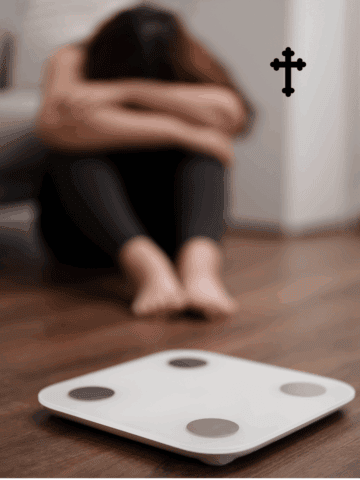I used to think a glass of wine or an extra cocktail was just my way of relaxing at the end of the day. But before I knew it, I was crossing that invisible line into heavy drinking. If you’ve ever felt like you’re drinking more than you should—or you’re simply curious about the power of prayer and alcohol fasting—keep reading. This is my story of faith, struggle, and hope.

I’m sharing my journey to show how the Orthodox tradition (alcohol fasting in this case) changed me in ways I never thought possible. After years of diets, detoxes, and broken promises, I found a spiritual framework that opened my eyes to what was going on inside my heart and mind. In this post, you’ll discover how combining prayer with simple fasting guidelines can be a great way to reclaim your health and your spirit. Whether you’re Orthodox, from another Christian background, or exploring faith for the first time, I hope my experience offers insight into how God’s grace can transform our deepest addictions.
1. My Struggle with Alcohol
Understanding the Basics
I was never diagnosed as an alcoholic, but the CDC’s definition of heavy drinking (15 or more alcoholic drinks a week for men) started hitting too close to home. What began as an occasional drink with friends turned into a crutch I used for stress relief. At first, it was small amounts of alcohol—maybe a glass of wine at dinner. Gradually, I added another cocktail, then doubled the dose, and even poured giant servings just to chase the same “relaxation.” My tolerance soared, and soon I needed more to feel that familiar buzz.
What is considered heavy drinking?
Heavy drinking means consuming too much alcohol regularly. The CDC defines it as 15 or more standard drinks per week for men and 8 or more for women. Drinking hard spirits, sweet wines, or high-calorie drinks too often can lead to weight gain, insulin resistance, and cardiovascular diseases. It’s an important factor in many health problems, including the risk of heart disease and certain cancers.
The Toll on My Life
This habit had excessive drinking written all over it. I gained over 30 pounds in five years, started having chronic inflammation and arthritis, and was even looking at potential medication like statins for my cholesterol. My moods worsened; I became short-tempered and impatient with my wife, and my kids noticed the tension. I tried fitness programs, meditation, self-hypnosis—anything to slow down my alcohol intake. But each time a celebration or social situation popped up, my resolve crumbled.
What happens when you drink alcohol every day?
Daily drinking can lead to insulin sensitivity issues, electrolyte imbalances, and metabolic rate changes. It also increases oxidative stress, which raises the risk of certain cancers and damages brain function. If you drink on an empty stomach, alcohol affects your fat-burning process and can slow weight loss efforts. Choosing moderate alcohol consumption, taking alcohol breaks, and drinking calorie-free drinks like black coffee or herbal teas can help your overall health.

2. Discovering Orthodoxy and Its Impact
Immersing Myself in Faith
When my family decided to convert to Orthodoxy, I was excited spiritually but didn’t really think it would fix my drinking problem. We started attending services, reading about the lives of the saints, and embracing the fasting window of Wednesdays and Fridays. At first, fasting from alcoholic beverages was surprisingly doable—I cut down during the week and saved the occasional red wine or white wine for weekends. That alone felt miraculous.
Eventually, though, I slipped back into old patterns after Pascha. By the time the Nativity fast arrived, I was panicking at the thought of going many days without drinking. Stress and cravings flooded back, and I was confronted with just how attached I still was to alcoholic drinks.
How long does alcohol withdrawal last?
Withdrawal symptoms start within hours after your last drink and can last days or even weeks. The next day may bring headaches, nausea, or anxiety. More severe cases can include shakes, sweating, and even seizures. Recovery time depends on various factors, including daily intake, medical conditions, and how much alcohol you consumed over time. Staying hydrated with zero-calorie drinks and eating healthy can help balance blood sugar levels during recovery.
When Prayers Moved Mountains
I had tried so many solutions, but I realized I’d never directly asked God to help me conquer this passion. So one day, after my usual prayers, I poured my heart out to God in my own words. I confessed my weakness and begged the Holy Spirit for help. From that day, the intense craving began to disappear. Each evening, I’d thank God and ask for continued strength.
Little by little, my focus shifted from counting standard drinks to counting blessings. My alcohol intake tapered off, and for the first time, it wasn’t just willpower—it was genuine spiritual change.
Now, I’m able to enjoy a favorite drink on truly special occasions, but I stay vigilant. I know that excessive alcohol consumption can easily sneak back if I’m not careful. However, I’ve tasted the freedom that comes from relying on God’s mercy and grace.
How long does it take to reset your body from alcohol?
Your body’s ability to recover depends on how long and how much alcohol you drank. It takes a few days for alcohol to leave your system, but full recovery of the liver and metabolism can take weeks or months. Cutting extra calories, focusing on fat loss, and following a fasting period can speed up recovery. The benefits of intermittent fasting include restoring glycogen stores, improving heart health, and reducing oxidative stress.

3. Why Alcohol Fasting and Prayers Worked When Everything Else Failed
Fasting and prayers became a lifeline for me when all other methods—like diets, exercise routines, and even meditation—fell short. It’s not that those methods don’t offer some benefit. It’s that, by themselves, they lack the deeper, spiritual connection that fuels true, lasting change. When you fast as part of your spiritual practice, you aren’t just following a set of rules; you’re dedicating your hunger, your struggles, and your devotion to our Lord. This personal faith gives meaning to every prayer you utter.
From an Orthodox perspective, faith isn’t a passive “hope for the best.” It’s an active trust in God’s power to heal and transform us. When we humble ourselves before God, admitting our failures and asking for His help, our hearts become open to His grace. Fasting then takes on a deeper purpose: it reminds us of our dependence on God and helps us stand firm against the passions that control us. Through this combination, prayers aren’t just words—they become a heartfelt cry that moves the Holy Spirit to work within us.
Is drinking alcohol a sin in Orthodox Christianity?
No, but Orthodox Christianity teaches moderation and self-control. The Church does not forbid alcohol, but it warns against excessive alcohol consumption because it can lead to sin.
The Apostle Paul reminds us:
“Do not get drunk on wine, which leads to debauchery. Instead, be filled with the Spirit.” (Ephesians 5:18)

4. Practical Tips for Overcoming the Passion of Alcohol
Fully Commit to Alcohol Fasting
I found it essential to commit fully to the rules of the fast, especially around alcohol. For me, that meant no alcohol on weekdays and only moderate drinking on days the fast allowed it. I had to be honest with myself—if I wanted to break free, I couldn’t make excuses. Once I decided, “I will respect the fast no matter how tough it gets,” I felt a real shift in my mindset.
- Say “no” to alcohol on weekdays.
- Enjoy only moderate drinking on days the fast allows it.
- Refuse half-measures or excuses.
Pray with All Your Heart
Next, I focused on prayer. One quick prayer in the morning wasn’t enough. I realized I had to invite God into every moment of my day. Before each meal—breakfast, lunch, and dinner—I prayed. When temptations struck, I said the Jesus Prayer: “Lord Jesus Christ, Son of God, have mercy on me a sinner.” This simple prayer felt like a lifeline when I needed strength.
- Pray at set times—morning, noon, and evening.
- Say the Jesus Prayer when you feel tempted.
- Ask God for strength in every moment of weakness.
Fill the Space with Good Things
Finally, I needed to fill the space that alcohol once took. I threw myself into activities that nourished my soul, like researching Orthodox topics for my blog, listening to podcasts, and playing Orthodox chants in the background. But you can choose any healthy distractions that speak to you. Consider volunteering at church, attending more services, spending time with parishioners, or visiting a monastery. Staying busy with things that draw you closer to God helps you break free from old habits.
- Find hobbies that uplift your spirit.
- Get involved in church activities or services.
- Spend time with parishioners or plan a monastery visit.

Final Take Away
Fasting and prayer saved me from a lonely and dangerous path. It wasn’t an instant cure; it was a gradual transformation fueled by God’s mercy and my daily commitment to stay vigilant. If you’re caught in a cycle of excessive drinking, don’t lose hope. Embrace the spiritual tools you have—humble prayer, sincere confession, and consistent fasting. Lean on your community and seek professional help if you need it.
I encourage you to share this story with someone who might need encouragement. Or drop a comment below on how moderate drinking or mindful fasting works in your life. God’s grace can and will meet you exactly where you are—sometimes, all it takes is one honest conversation with Him to open a door you never knew existed.
Disclaimer: This post offers spiritual encouragement and personal testimony. For specific medical advice, please consult a healthcare professional.
Watch This Video
Here is a great YouTube video on this topic:
Frequently Asked Questions
Fasting from alcohol has many health benefits. It gives your liver time to heal, improves fat burning, and lowers calorie intake. It also stabilizes insulin levels, helping with weight loss efforts. Skipping alcohol during your eating window can reduce oxidative stress and improve your sleep cycle. The bottom line: Taking alcohol breaks can go a long way in improving overall health.
The liver can suffer silently for years before showing signs of damage. Four major warning signs include:
- Jaundice: Yellowing of the skin or eyes.
- Swelling: Fluid buildup in the legs or abdomen.
- Chronic Fatigue: Constant tiredness or weakness.
- Dark Urine & Pale Stools: Changes in color due to bile buildup.
If you notice these symptoms, consult a doctor. Federal government websites and official websites like PubMed provide more details on liver disease.
Yes, the liver has a strong ability to heal. If you cut back on moderate amounts of alcohol and maintain a healthy lifestyle, your liver can regenerate. Avoid calorie-dense macronutrients like high-fat and sugary foods to speed up recovery. Drinking fewer drinks and switching to dry wine with fewer calories instead of light beer or hard spirits can also help.
The liver needs at least 14 alcohol-free days to start healing. Going one month without alcohol gives best results in reducing inflammation and stored fat. A longer break leads to different results, depending on type of alcohol consumed and personal health reasons.
To repair liver damage, follow these steps:
1. Quit alcohol or limit it to moderate amounts
2. Follow an intermittent fasting diet to aid fat burning
3. Eat nutrient-rich foods and avoid artificial sweeteners
4. Drink plenty of water and replace alcohol with zero-calorie drinks
5. Exercise regularly to reduce potential risks like insulin resistance
Healing takes time, but the bottom line is that your liver can recover if you make the right choices.







Comments
No Comments